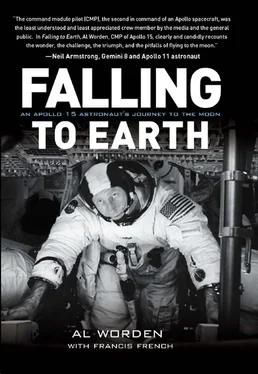It was quite a change for me to go from thinking about the music world to an entirely different life in the military. I am ashamed to say that, once I knew I was going to attend West Point, I really let my work slide for the rest of that year at Michigan. I got through okay, but not well; I had lost interest, because I knew I was leaving.
I was also depressed. My grandfather had always felt pain in his injured ankle, especially in winter. Now, his doctor found that the old break had also created a blood clot. They had to amputate one leg, and then the other. With no legs, that tough and active farmer lost the will to live. He died while I was at college, and I felt I had lost my best friend. There was now even less reason for me to stay in Michigan.
I had to report to West Point in early July of 1951. I took a plane, my very first flight, in fact, to get there. I would spend the night in New York City before taking a train to the academy.
I had never been to a big city like New York before; I was unsure how to act. But I was hungry, and that gave me courage. After strolling around town and spying some nice-looking restaurants, I walked into one and asked the maître d’ for a table. They required a jacket and tie, he said, and I wasn’t wearing either. I was heading for the door, when to my relief, he told me he would see what he could do. Emerging with a tie and jacket from a nearby closet, he told me I could stay. It was a strange introduction to a much wider world.
I was about to join an even stranger world: the United States Military Academy at West Point, fifty miles north of New York City, overlooking the Hudson River. It is not only one of the biggest school campuses in the world, but also has been an academy since 1802. The day I showed up with more than eight hundred other new students, our lives all changed.
My first view of West Point left me awestruck. We traveled alongside the Hudson by train, then disembarked by the river. After being assembled into groups, we were marched up the steep hill to the academy. I was completely blown away by the sight: the lofty gray stone buildings, set against a green forest and the blue river below, seemed like something out of the Middle Ages. Inside, the main hall looked like a vast European cathedral. It could seat two and a half thousand hungry students at once, while long-dead venerable generals who once studied there, too, looked down sternly at us from oil paintings. Naturally, I was intimidated by the scale and dignity of the place. Would I survive at this strict institution? I wasn’t sure.
Then we were thrown into the furnace. Older students appeared all around us, screaming a rain of commands, most of which I couldn’t understand. We were lined up in a hallway and ordered to memorize a response to a command. It should have been simple, but with students right in our faces, nose to nose, shouting at us, it was hard to remember even the simplest phrase. It was terrifying. I was only allowed to look directly ahead, but could hear piercing shouts, commands, and marching all around me. I had no idea what the hell was going on. I had to suck in my gut and mentally steel myself. “I’m going to survive this,” I repeated silently to myself, “I’m going to survive.”
Ordered to the barbers by a hail of screamed commands, we all had a haircut, thirty seconds per student, and at the end we had almost no hair left. Then we put on our unfamiliar new uniforms. We packed our civilian clothes away: we wouldn’t see them again for a year, and by then they wouldn’t fit us anymore. We’d lose a lot of weight and put on a lot of muscle.
Right away, the older students taught us marching drill. From day one, they owned us. They drilled the hell out of us until we were lightning fast at responding to orders. By the second day, we marched everywhere in formation. They even lined us up to head to the showers and gave us one minute to get clean and get out. Everything we did had an overriding sense of urgency, discipline, and precision. They only left us alone when we slept.
I had spent a year in college already. No one cared. Another student had already graduated from another college, and it didn’t matter in the least. We all started from scratch and took the same courses. You can’t lead until you learn how to follow: that was the West Point philosophy. I quickly learned how to follow.
The senior students pushed us hard from the time the Drum and Bugle Corps of the West Point band woke us up at 6:00 a.m. until we collapsed into bed at the end of the day at 10:00 p.m. When that band started playing in the morning, it was loud enough to wake the dead, and was followed by the clatter of boots on stairways as everyone rushed downstairs to get into formation. Orders were shouted, bells rang, and in response hundreds of students moved instantaneously in tight precision, as if they were one person.
Marching in formation, eyes straight ahead, chin tucked in, commands yelled at us from all sides, we’d head to the mess hall. When we heard the shouted command of “Taaaaaake SEATS!” we sat in unison. We ate sitting at rigid attention, our eyes locked on our plates as orders and questions were barked at us. If our answers were not satisfactory, we would be ordered to stop eating and recite academy regulations until our inquisitors were appeased. Away from the mess hall, minor infractions led to twenty pushups or some similar torture. I particularly dreaded the command to lie on a four-inch-wide horizontal bar high off the ground and make swimming motions with my arms and legs until they burned with pain.
Our uniforms and shoes had to be immaculate. Anything less than a perfect fold of cloth or a perfect shine of brass and leather and we were pounced on and punished. If our hair was a fraction too long, or even if we had a smidge of dirt under our fingernails, we were in trouble. Our rifles had to be perfect, too, and we learned how to take them apart, clean and reassemble them before practicing elaborate drills.

In my uniform at West Point
For the first month, a football player shared our barracks. This huge, tough guy was so intimidated by the constant commands that he couldn’t summon the courage to leave the room at night to use the bathroom. The moment he stepped out of the door, even in the middle of the night, he knew some older student might pounce on him with a new set of commands. Instead, frightened and humiliated, he’d pee in the sink.
That first year was pure hell, and I felt I would never last. Sizing up some of the other new cadets, known as plebes, I thought: I am dead. They’re the cream of the crop. I’m just a Michigan farm boy, and I’ll never be able to compete with them. I was as concerned about my peers as I was about the older students. So I decided to keep my head down, stay out of trouble, and make sure I did everything I was supposed to do, exactly the way it was supposed to be done, without cutting corners. I shined my shoes every day, went to formation early, and always stood up straight with my chin in. Thankfully, after I had been there for a few months, I settled into a routine, and nobody bothered me. I was rarely called on the carpet. A lot of my fellow plebes had trouble figuring this out, and many of them left. To be honest, I even came to like the routine. If you really got with the program, became part of the system, and did what you were supposed to do, life became tolerable, as you did pretty much the same thing every day.
The older students really whipped us into shape—if we could stand the pace. Many of the plebes couldn’t stand the pressure. Nearly half of my classmates dropped out before graduation. Some probably didn’t make it through the first day. For those of us who could handle the mental anguish, however, it changed our lives. If we did something wrong, the punishment was so harsh we would never do it again. The system made soldiers out of those who could handle discipline and were willing to work at it.
Читать дальше













